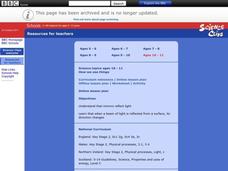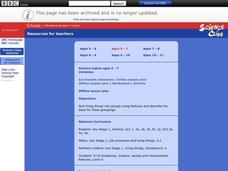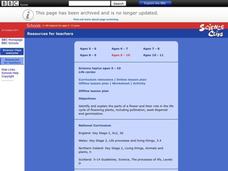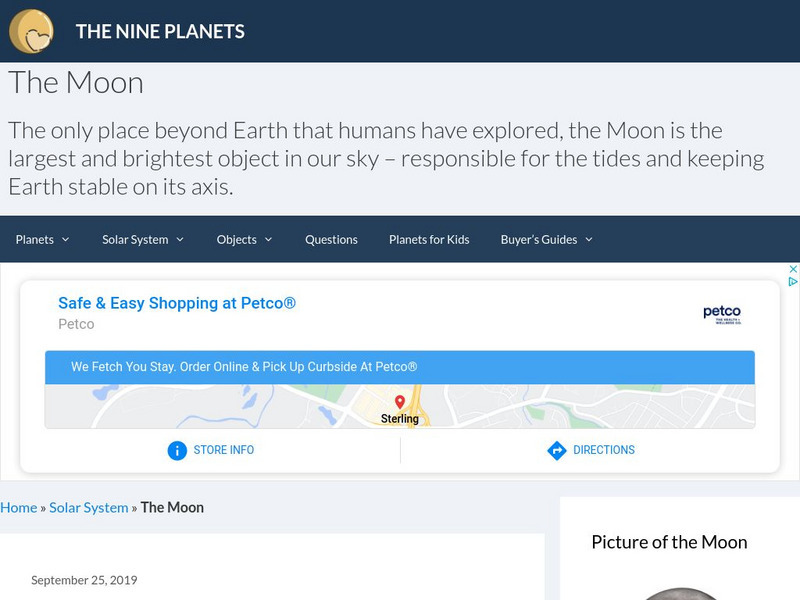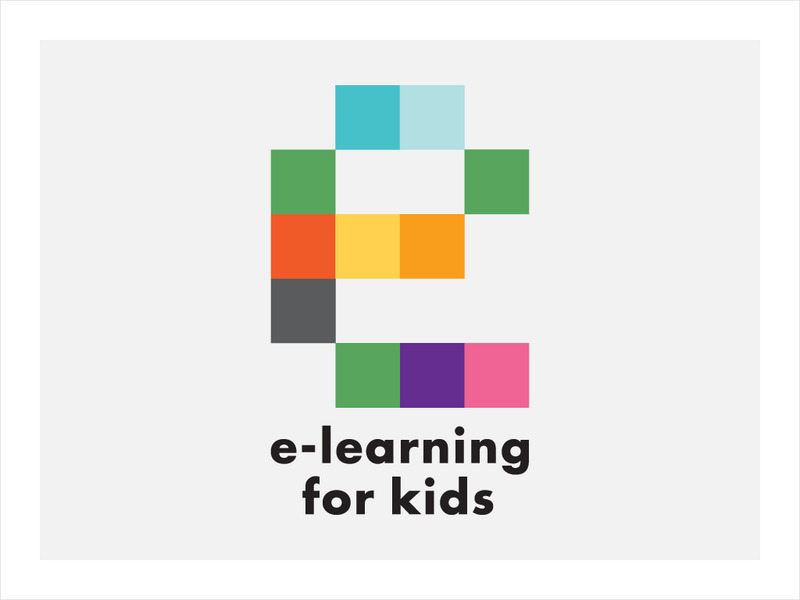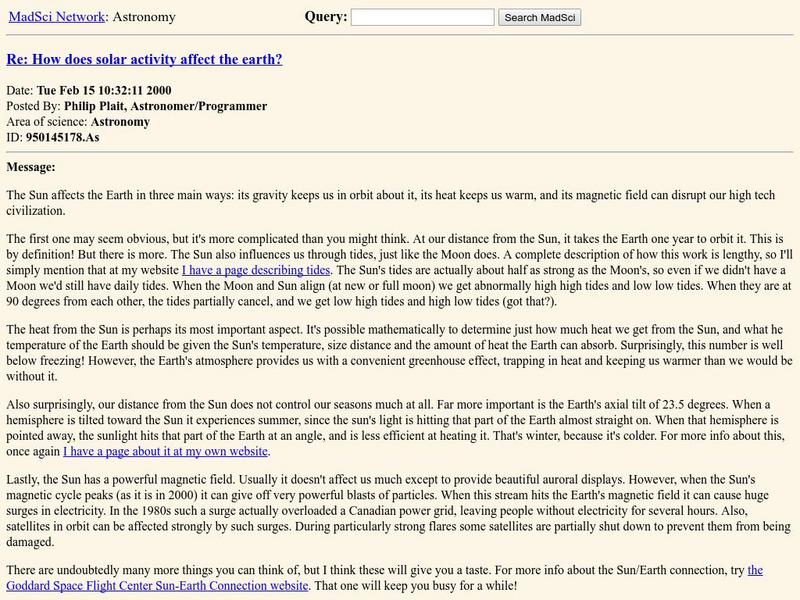Curated OER
Micro-organisms
Students examine how micro-organisms are living organisms that are often too small to be seen. They explain that micro-organisms may be beneficial or harmful.
Curated OER
How We See Things
Students explain that mirrors reflect light. They examine how when a beam of light is reflected from a surface, its direction changes.
Curated OER
Changing Circuits
Young scholars participate in an online instructional activity to explain how to make bulbs brighter or dimmer in a series circuit by changing the number or type of components.
Curated OER
Variation
Students practice sorting living things into groups using their characteristics. Using pictures of leaves and animals, they sort them based on their color and shape and write the objects characteristics under the picture. They share...
Curated OER
Moving and Growing
Students work with a partner to brainstorm a list of as many human body parts as possible. Using that list, they circle any one of those that are bones. They are shown a model of the human skeleton and practice locating various bones. ...
Curated OER
Keeping Healthy
Students review what the heart does and why the muscles in the body need oxygen. As a class, they measure their pulse rate while they are resting and after they have jogged for three minutes. They are helped by their teacher to convert...
Curated OER
Grouping and Changing Materials
Students feel and observe different types of materials. Using the internet, they sort objects based on the materials they are made from and justify their reasons for putting it in a certain category. They identify objects that could...
Curated OER
Using electricity
Students explore how a switch can be used to break a circut. Students construct a simple series circuit and use it for a purpose. Students read the "The Lighthouse Keeper's Lunch,or one of the "Katie Morag" stories which clearly shows...
Curated OER
Helping plants grow well
Students explore the effect of water, temperature and light on plant growth. Students are asked if they remember the LAW for plants. This is Light, Air(temperature) and Water, which all plants need for growth. Students are divided...
Curated OER
Life cycles
Students identify and explain the parts of a flower and their role in the life cycle of flowering plants, including pollination, seed dispersal, and germination. Students recap the following information: that plants need light, warmth,...
Curated OER
Changing Sounds
Students identify how the pitch of an instrument can be altered. They complete a worksheet by labeling several images in order of pitch and then fill a bottle with water to create a sound that matches a pitch on a drawn card.
Curated OER
Gases Around Us
Pupils participate in a whole class discussion about solids, liquids, and gases. Students get involved in a teacher-directed experiment related to solids, liquids, and gases. Pupils complete worksheet, writing the names of the parts of...
Curated OER
Changing State
Students identify the changing states of water, water vapor and ice in the water cycle They investigate how each of these stages can be reversible. Students complete a worksheet describing the water cycle.
Curated OER
Circuits And Conductors
Students predict the common classroom items, such as paper clips, chalk, keys, or erasers, that will be good conductors in a circuit. They build circuits using a variety of circuit diagrams to test their predictions.
Curated OER
Teeth and Eating
Students explore animal diets and teeth. In this animal science lesson plan, students view photos of animals and their teeth. Students identify the type of diet the animal has based on the teeth. Students are introduced to the terms...
Curated OER
Weather Myths
Fourth graders relate myths to weather phenomenon. They write and illustrated a weather myth and present it to the class.
Curated OER
Watershed Management
Learners investigate the concept of a watershed. They conduct research into the concept using a variety of resources. Students take a field trip to a local watershed to make observations. The outcome is a report concerning the outside...
Curated OER
Physics Post-Lab
Students explore physics. In this science lesson plan, students discuss physics in their everyday lives. Students complete a physics worksheet.
Nine Planets
The Nine Planets: The Moon
Explore the mythology, structure, observational history, gravitational force, and orbit of Earth's Moon.
PBS
Pbs Learning Media: Why Doesn't the Moon Fall Down?
In this animated video segment adapted from NASA, astronomer Doris Daou explains how the forces of speed and gravity keep the moon in a constant orbit around Earth. [1:36]
E-learning for Kids
E Learning for Kids: Antarctica Penguins: How Does the Moon Influence the Tide?
This lesson explains how the moon affects tides on Earth and about the different types of tides.
MadSci Network
Mad Scientist: Why High Tide Away From the Moon or Sun?
An excellent and thorough answer to the often asked question about high tide "bulges" on the side of Earth facing away from the Moon or Sun.
Texas Education Agency
Texas Gateway: Newton's Universal Law of Gravitation
By the end of this section, you will be able to explain Earth's gravitational force, describe the gravitational effect of the Moon on Earth, discuss weightlessness in space, and understand the Cavendish experiment.
OpenStax
Open Stax: Newton's Universal Law of Gravitation
In the following interactive students will explain Earth's gravitational force and describe the gravitational effect of the Moon on Earth. They will discuss weightlessness in space and examine the Cavendish experiment.



